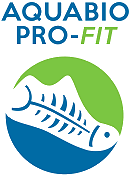News
10.06.2019
Interview - Katerina Kousoulaki from Nofima

The AQUABIOPRO-FIT consortium is led by the Norwegian Institute of Food, Fisheries and Aquaculture Research, NOFIMA. In this interview, Katerina Kousoulaki, AQUABIOPRO-FIT’s Project Coordinator, talks about her passion for fisheries and responsible resource use.
What is your area of expertise?
I am a biologist specialized in animal physiology, nutrition and processing, focusing mostly on marine raw materials.
How did you come to work in this field?
Working in food production always felt meaningful and as I had a natural attraction to the sea and the animal kingdom it was also inevitable for me to work with aquaculture. This sector is very advanced in my home country of Greece and even more so in Norway where I am currently living with my family.
What is your role in the AQUABIOPRO-FIT project?
I am the Project Coordinator of AQUABIOPRO-FIT and I am also involved in the technical and scientific tasks of the project related to rest biomass evaluation, downstream processing and extraction of bioactives.
What was it about AQUABIOPRO-FIT that triggered your interest?
I’ve always had strong feelings against wasting food and an equally strong love for fisheries and fish farming. AQUABIOPRO-FIT combines both these passions. A large number of consumers eat too little or no fish at all, thus limiting their own intake or that of their children of essential nutrients present in seafood. The ultimate goal of AQUABIOPRO-FIT is to demonstrate the health value of fish and in particular fish side streams through comprehensive biological studies, both in the lab and with people. At the same time the project will develop food products or supplements concentrating these health benefits in easy to take powders or pills.
What do you see as the biggest challenge in moving towards a circular economy?
A challenge in moving towards a circular economy in the western world is the fact that consumers are spoiled with an oversupply of goods including food and there is a general practice of wasting food with short expiry dates. Products that are closely related to traditional foods and food that is fresh and hasn’t undergone much processing are consumed the most. However, these products are not often included in the circular economy. Additionally, as a result of growing consumer awareness of potential negative impacts of processed food and constantly evolving food safety regulations, stricter requirements are imposed on food processing. Therefore, it may be a difficult task to be able to guarantee that undesirable compounds are not present in materials intended for food purposes. This could prohibit the use of fish side streams in food due to consumer, logistical and economic concerns.
What are the main advantages of EU projects such as AQUABIOPRO-FIT?
EU projects, such as AQUABIOPRO-FIT, have the necessary critical mass and status to both perform good science, reach the general public and policy makers, and enable change.
The Consortium consists of 3 universities, 1 large company, 3 SMEs, 1 NGO and 4 research institutes from 7 European countries. Find out more about NOFIMA and the other AQUABIOPRO-FIT project partners in the links below.
Relative project terms
Clinical tests , Communication , Fish side stream bioactives , Marine nutritional supplement development , Model studies - documentation , Training , Tunicates
Category: Internal project activities
×
![]()






